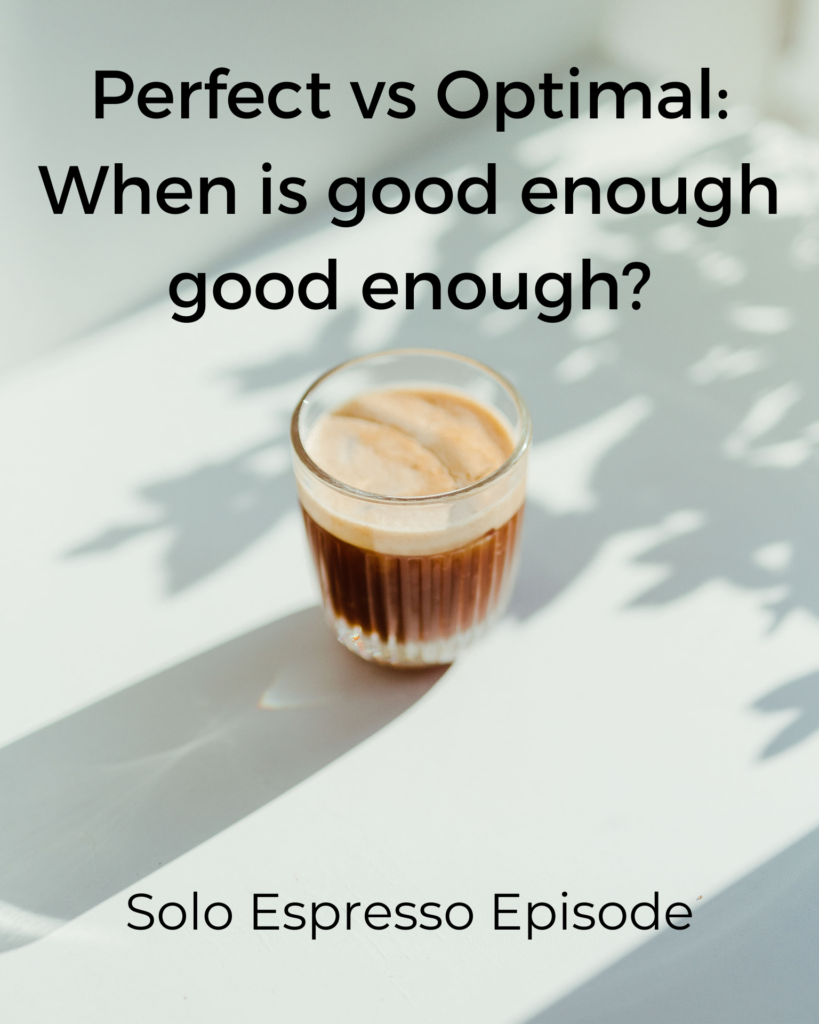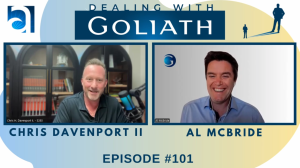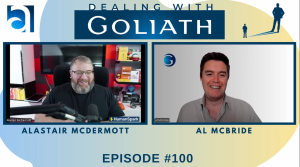Show Notes:
- Sub optimal and not being enough
- A vice is a virtue over done
- Embrace the positive of a habit you’re trying to stop
- Design Thinking and the benefit of fast feedback loops
- Adaptive and maladaptive behaviours
- An acid test to know if a behaviour is serving you
- Catastrophizing as the opposite of being an optimalist
- Why I love working with Negotiators: Marginal gains, big impact
Transcript
Al McBride 0:02
Welcome to the dealing with Goliath podcast. I’m Al McBride. This is a solo espresso episode that I call perfect versus optimal. When is good enough, good enough?
Al McBride 0:17
So I had an interesting thought there the other day because I’m a regular visitor to Berlin and I’ve a lot of friends there from previous life in the art world and other other reasons. One of my favorite all time German phrases is “das ist sub optimal” that is sub optimal, which is a beautifully German way of summing up when something’s not quite up to standard or up to expectations, sub optimal.
Al McBride 0:50
I was thinking about this that how well first of all, how a therapist friend of mine in Germany here used to say that, this idea of always being able to be that bit better is one of the reasons she has so much work. It’s a thing in the culture. So she said, That’s not I’m just speaking as a reporting a third party there.
Al McBride 1:14
But this idea of never quite enough, you got 95%. Well done, let’s work on the last 5%. So some people get a complex about not quite always, never quite being enough. That’s a whole other the idea of being enough is a whole other series of, of little podcast recordings.
Al McBride 1:36
But it made me start thinking about perfectionism, and how an awful lot of my clients particularly a couple of years ago, for some reason, often whether it was the presenting problem, or something just in the mix presenting issue, this notion of perfectionism. I did have a few clients who are like, no, I really need to break this down because it’s stressing me out.
Al McBride 2:02
And we’d dive into. It’s this idea that they’re constantly going too long spending way more time than their colleagues doing a particular task or putting together a report or whatever that might be.
Al McBride 2:16
Same with small business owners planning way too much time preparing for something, I’m still criticized for that with some of the trainings that I give, but I like to feel that I’m covering the ground that needs to be covered, you know, so I wouldn’t necessarily call myself a perfectionist, but I can understand that point of view.
Al McBride 2:34
Now, it was interesting, because one of these people was actually a coach themselves. When I was talking to her, I said, I said, so the main question a normal coach, or a beginner coach would ask is, what’s it costing you?
Al McBride 2:51
Because they want to build up the negative space to have a contrast for you to move over. But of course, I already knew she had a lot of leverage on herself. She was already saying, I need to solve this problem. So we didn’t need to add too much more there. So instead, I said, What are the benefits of the perfectionism?
Al McBride 3:14
That’s an interesting question. That’s the point is that often when we’re trying to change a habit, we throw the baby out with the bathwater we got old, because something’s out of whack. Does that old phrase, a vice is often a virtue, overdone. vices vise is often a virtue overdone.
Al McBride 3:40
So there’s something that’s out of balance, that it can be something that’s quite useful to you. But it’s overplayed, and then it becomes negative. This is a very interesting point. So asking, for example, what a God is, oh, yeah, my work ethic and attention to detail on all of these things of how she was really very accomplished at our career came out. An awful lot of that was to do with perfectionistic attitude. So she was suffering, the consequence of that virtue becoming a vice.
Al McBride 4:15
But again, we often take these things in an accountancy setting of having, we’re either in the black or in the red, you know, we’re either in credit or we’re in debt. It’s not that simple. So there’s an awful lot of habit change, it’s often very helpful to embrace the positive side of what it’s getting you and then deal with when it gets out of whack when, as I said, that virtue becomes a vice.
Al McBride 4:40
What we tend to find very quickly, is that it’s when it becomes when it hits that point of diminishing returns. So it’s, its benefits, benefits, benefits, and then suddenly, or no, it’s cost me way more now than it needs to. Right. So it’s that question of when is good enough, good enough.
Al McBride 4:59
This is The difference between a perfectionist mindset or approach, and what might be called an optimalist, someone who’s looking for the optimum. So when you’re looking for the optimum, what’s the difference, you’re acutely aware of where that cost starts to kick in, where there is that diminishing returns.
Al McBride 5:22
So when he is going that extra mile, that extra bit of effort, that extra focus, that extra time investment, the one asset that we can never really make more of, when does that point and start acute awareness?
Al McBride 5:38
And we help help to get a perspective on that of where that point might be. By also going well, what’s the consequence? So if it’s something minor, maybe good enough, is good enough. You keep your powder dry for something where when you go that extra mile, it really has impact.
Al McBride 5:54
Because you have that extra time saved from knowing we’re good enough is good enough. No, I’m not advocating for a second shoddy work, or being poor, at whatever you do, absolutely not. I am talking about optimal that point where most vast majority of people won’t notice any difference if you go anymore.
Al McBride 6:14
That’s another way of looking at it. The other key difference is optimalists embrace reality. An awful lot of work was done on this some of the very nicely by I think it’s Harvard psychologist, but it’s Tal Ben Shahar. He wrote a book, the Pursuit of Perfect as this idea that we hope to have the realism, the optimism is another form of perfectionism. But it’s so distinctly different, that it needs a different name.
Al McBride 6:45
That’s why it’s actually a very similar thing. But it’s dealing with reality. It’s the absolute awareness that you will never be perfect, it will never be perfect, it can always be better, no matter how good it is. But being okay with that, still putting in the effort to make it as good as possible for the cut you for what you want out of it and the context deserves.
Al McBride 7:10
That’s the optimal as point the perfectionist is a lack of realism there, there’s almost a compulsion, which is, as I said, is detrimental and can be even unhealthy. Because they said it’s better to use it more of than a harbor or shore to a much then as a guiding star that is just principle to move toward, but know that you’re never really going to get there.
Al McBride 7:34
As I said, one of the ways to change the context of where to go that extra mile versus ‘no now is good enough’, is to zoom out. It’s often something people fail to do they get stuck and wanted a level of perspective. Whereas when you zoom out, you ever see Oh, okay, this doesn’t really matter in the grand scheme of things it needs to be done needs to be done to that 80 90%, perfect level 90% brilliant level. But that’s enough.
Al McBride 8:01
Once that’s enough, then Okay, I can move on, or maybe get feedback on it. Another thing people do is they do that. They do way too much before they get the feedback. It’s like the sort of agile development idea that software engineers are all about.
Al McBride 8:16
They’re dead right at fast feedback loops, like we have in design thinking, where you put it to the user or customer, whoever that might be the client, and then get the feedback and loop back and then improve from there rather than going into heavy assumption levels.
Al McBride 8:33
This kind of comes into this idea of, I’m given quite a lot of stuff that I could actually go back and do whole episodes on. But what the heck is this idea of adaptive versus maladaptive behaviors. So how do you know if a behavior is serving you or if it’s not serving you?
Al McBride 8:49
Well, one of the simple little litmus tests or acid test, and it’s not foolproof by any matter, but it’s just an interesting thought, is to ask, Is this keeping me stuck? Or is this giving me more options? If it’s giving you more options, then it’s usually quite adaptive, by definition, you’ve adapted to the situation rather than maladaptive.Where you feel stuck or less options.
Al McBride 9:14
This in many ways is the opposite. It’s the flip it occurred to me of catastrophizing, so this this thinking error, there are many of them, I’ll come back to them. I’ll do one on catastrophizing. There’s a thinking error called catastrophizing, where basically, you might say you make a mountain out of a molehill.
Al McBride 9:33
So something quite made minor. Most people would say how important this thing is on one to 10 people might say three or four, whereas the catastrophizers will be up eight 9, or 10 territory, they’re making this huge deal out of it. What’s interesting is when everybody else says the situation as an eight, nine, ten to catastrophize er sees not that much difference their their reaction, the physiological reaction is virtually the same.
Al McBride 10:00
It occurred to me that’s the exact opposite of the optimalist as the optimalist is the one with that optimal awareness sees exactly where, okay, this situation is now gone to a four to a five, a seven to an eight, or whatever, and is able to give it that extra bit of attention or bring in those extra resources, as needed. This is this is a key key difference.
Al McBride 10:25
In many ways, then it occurred to me that this is why I really enjoy working with negotiators. This is one of the key reasons that I chose to focus there a good few years ago, partly because I have experienced, you know, doing lots of three dimensional deals with the art world and all this sort of stuff and selling things and lots of different selling for people versus selling where, you know, it’s your bread and butter and you depend on how different those are.
Al McBride 10:51
That’s a whole other episode too. But it’s this thing that when I work with negotiators, those marginal gains those small improvements as a going that extra mile to to find that extra creative potential Avenue or solution or that underlying thing that because in every negotiation to something neither side are aren’t saying to the other.
Al McBride 11:16
Often neither side really know what that is. But when you find this, it’s what Chris Voss likes to call a black swan, he named his whole company after it. But it is that kind of hidden gem that unlocks huge new potential value. But even when you don’t do that, even when that’s could be a massive game, but even when you don’t do that those marginal gains cannot up because if it’s a six or seven figure deal or even a five figure deal, but it’s it’s again, whether you pay the rent and eat that month type of thing or whether you’re going on holiday with the family or not.
Al McBride 11:47
That’s the difference. That kind of couple of grand extra whether it’s five grand 20, Grand 50, grand hundred grand extra, that can make a difference. That’s like we’re going on the family holiday we’re not getting a new car or we’re not it’s that level of differences. marginal gains can make a huge difference.
Al McBride 12:08
I suppose that’s one of the reasons why I really enjoy working with negotiators. So it goes back to that question when is good enough good enough? I feel I’m gonna do a few more and the subject in time to come but perfect versus optimal. It can really pay times of giving you back that one thing you can never make more of time is getting really clear, getting reflective, taking that extra little point of distance and asking yourself is this optimal or am I going overboard? Am I going to toward perfect when is good enough good enough?
Transcribed by https://otter.ai



